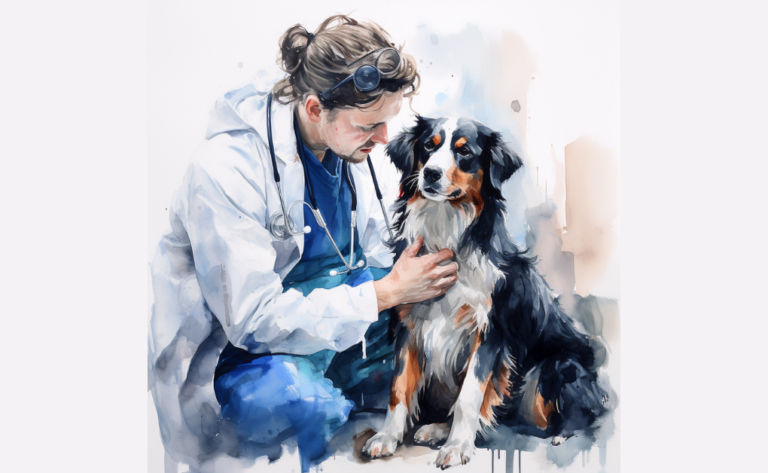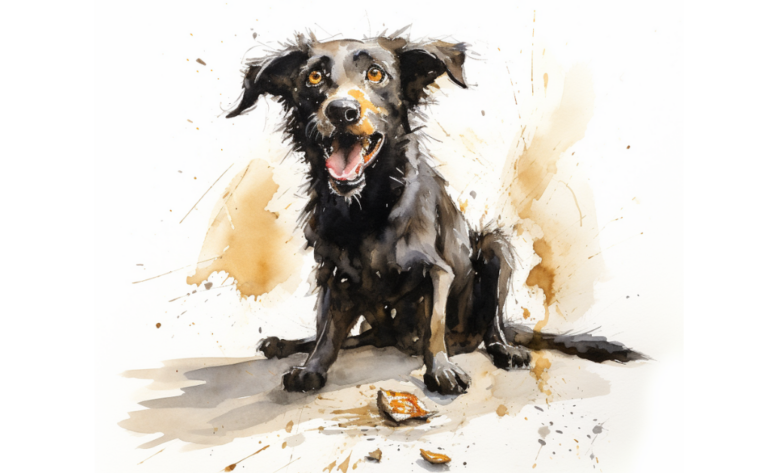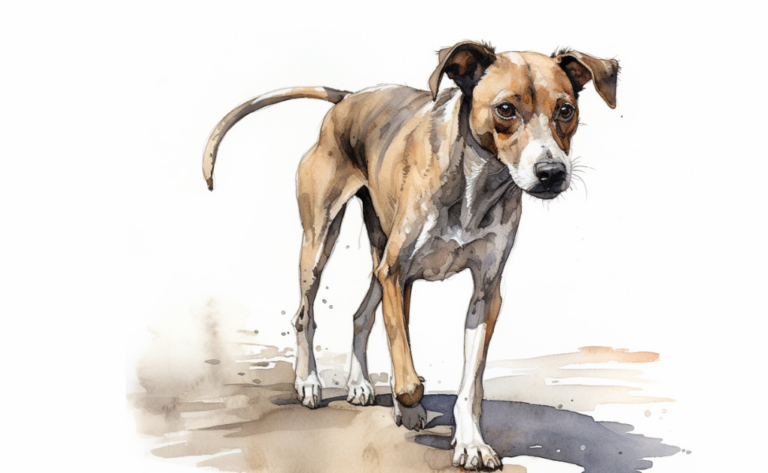What is Hypothyroidism in Dogs?
What is it?
How is it Treated?
Breed Predispositions
Golden Retrievers Doberman Pinschers Dachshunds Irish Setters Boxers Cocker Spaniels Great Danes Miniature Schnauzers Bulldogs
Introduction
When Sarah began to notice that her normally active and cheerful Greyhound, Max, had become lethargic and was gaining weight despite no change in his diet, she grew concerned. Additionally, Max’s once-shiny coat had become dull and thin. Seeking answers, Sarah took Max to their trusted veterinarian for a thorough examination. After running several tests, the vet diagnosed Max with hypothyroidism, a condition that Sarah had never encountered in her previous experiences with dogs.
Hypothyroidism in dogs is an endocrine imbalance characterized by the thyroid gland’s inadequate production of thyroid hormones, which are crucial for controlling the dog’s metabolism. These hormones are instrumental in numerous physiological functions, including maintaining healthy skin and coat, overseeing growth and development, and regulating energy levels.
This thyroid disease, known as primary hypothyroidism, considerably impacts various bodily systems and can dramatically alter your canine companion’s overall health and vitality. This disorder is typically prevalent in middle-aged to older dogs and is commonly observed in certain breeds such as the Golden Retriever, Doberman Pinscher, and Cocker Spaniel. The management of this condition predominantly involves administering lifelong medication to supplement the deficient thyroid hormone levels.
What is a Thyroid Gland in Dogs?
The thyroid gland in dogs is a small, butterfly-shaped gland near the trachea or windpipe in the neck. Despite its small size, the thyroid gland plays an incredibly critical role in the overall health and function of a dog’s body.
The primary role of the thyroid gland is to produce and secrete thyroid hormones, namely triiodothyronine (T3) and thyroxine (T4). These hormones are essential for regulating the dog’s metabolism – the process by which the body converts food into energy. In addition, the thyroid hormones influence virtually every organ system in the body. For example, they control the rate at which cells burn fuel from food, affect heart rate, regulate body temperature, and contribute to the growth and development of the nervous system.
A dog’s thyroid gland operates in a feedback loop with the brain. The hypothalamus and the pituitary gland in the brain release hormones that instruct the thyroid when to produce and release T3 and T4. This balance is crucial for maintaining the dog’s health and overall metabolic function.
When the thyroid gland is not functioning correctly, such as in hypothyroidism, where it is underactive and doesn’t produce enough thyroid hormones, it can lead to various health problems. These can include lethargy, weight gain, skin and coat issues, and other symptoms. Conversely, an overactive thyroid gland, a condition known as hyperthyroidism, can also cause various health concerns, such as weight loss, increased heart rate, and hyperactivity.
Causes of Hypothyroidism in Dogs
Hypothyroidism in dogs, often signified by a low thyroid hormone concentration, typically arises from one of two primary conditions – lymphocytic thyroiditis or idiopathic thyroid gland atrophy.
Lymphocytic Thyroiditis
Lymphocytic Thyroiditis is an autoimmune disease where the dog’s immune system erroneously targets its thyroid gland, triggering inflammation and subsequent gradual destruction of the thyroid tissue. This process ultimately leads to decreased thyroid hormone production. The exact catalyst behind this autoimmune reaction remains unclear, but genetic factors are suspected to play a part.
Idiopathic Thyroid Gland Atrophy
On the other hand, Idiopathic Thyroid Gland Atrophy involves the gradual replacement of functional thyroid tissue with fatty tissue over time. The cause of this condition, aptly named “idiopathic” – meaning of unknown origin – is not yet fully comprehended; much like lymphocytic thyroiditis, idiopathic thyroid atrophy results in diminished production of thyroid hormones.
Hypothyroidism in dogs can also stem from less frequent causes, such as certain medications, dietary complications, and exposure to toxins. Surgical removal of thyroid tumors or the entire gland can also induce hypothyroidism. Furthermore, it’s notable that while hypothyroidism can manifest in any dog breed, medium to large-breed dogs shows a higher incidence rate, hinting at a potential genetic predisposition.
The thyroid gland’s critical role in a dog’s body is to generate hormones regulating metabolism. Consequently, when these hormone levels decline, multiple body systems are affected, resulting in symptoms observed in a hypothyroid dog, such as skin infection and thickening skin.
Symptoms of Hypothyroidism in Dogs
The clinical signs of hypothyroidism in dogs can vary significantly, mirroring the extensive impact of thyroid hormones on various body systems. These symptoms often start subtly and gradually intensify, sometimes making the disease difficult to detect.

- Affected dogs may display unexplained weight gain, which occurs despite no significant changes in diet or exercise. Alongside this, they may show signs of lethargy and decreased activity levels – symptoms that are too common when thyroid function in dogs is compromised.
- Alterations in the dog’s coat and skin may also indicate hypothyroidism. This could manifest as thinning hair, dryness, or recurrent skin infections. Cold intolerance, where the dog seems more sensitive to lower temperatures than before, can also be a telltale sign.
- Reproductive issues may emerge in dogs where hypothyroidism occurs. This could include testicular atrophy in males, whereas females may experience irregular estrous cycles.
- In some instances, the destruction of the thyroid gland may lead to neurological problems. As a result, dogs may display various issues ranging from seizures to changes in temperament or behavior.
- Other symptoms suggesting hypothyroidism include a slower heart rate, increased cholesterol levels, anemia, and constipation. Some dogs may also develop a puffy or swollen facial appearance, often called a “tragic face” expression.
Remember, the symptoms mentioned above and treatment options should always be discussed with a veterinarian, as hypothyroidism can greatly affect a dog’s health.
How to Diagnose Hypothyroidism in Dogs?
Diagnosing hypothyroidism in dogs entails a series of tests to eliminate the possibilities of other ailments and confirm the diagnosis of canine hypothyroidism. Hypothyroidism’s effects can mimic other conditions, so a holistic approach is essential for a definitive diagnosis.
Complete Blood Count (CBC) and Biochemical Profile
This preliminary blood work offers general data about the dog’s health status and can assist in excluding other conditions that may be responsible for the dog’s symptoms. Nevertheless, these tests are insufficient for diagnosing hypothyroidism independently.
Thyroid Function Tests
These tests, crucial in diagnosing hypothyroidism, evaluate the concentrations of various thyroid hormones in the dog’s blood, including T3 and T4. A low T4 level, for instance, could suggest an underactive thyroid gland. The Total T4 concentration serves as the initial screening test for hypothyroidism and holds a high diagnostic sensitivity (~90%), albeit a low specificity (~50%).
Thyroid-stimulating Hormone (TSH) Test
In certain instances, a TSH test may also be performed. For example, middle-aged dogs suffering from hypothyroidism often exhibit elevated TSH levels as the pituitary gland produces more TSH to stimulate the thyroid gland.
Thyroid Scintigraphy
This advanced imaging method utilizes radioactive isotopes to visualize the thyroid gland. It can yield detailed data about the gland’s size and function. Still, it’s generally employed for complicated cases because it demands specialized apparatus and expertise.
Autoantibody Tests
Some dogs with hypothyroidism generate autoantibodies against their thyroid hormones or thyroid tissue. These can be detected with particular blood tests and could indicate autoimmune thyroiditis, a frequent cause of hypothyroidism in dogs.
It’s important to note that testing for hypothyroidism should ideally be done progressively. Therefore, the dog’s thyroid levels should be evaluated and monitored over time, especially since other diseases can mimic hypothyroidism, creating complexities in the diagnosis.
Treatment of Hypothyroidism in Dogs

Hypothyroidism management in dogs typically comprises medication, regular monitoring, and supportive care. The central objective of treatment is to restore the balance of thyroid hormone production, thus alleviating symptoms and enhancing the dog’s quality of life.
Thyroid Hormone Replacement Therapy
The mainstay of treatment for hypothyroidism in dogs is hormone replacement therapy. The dog is given a synthetic form of thyroxine, the hormone that the thyroid gland normally produces. The following are considered the best treatment options:
- Levothyroxine: This synthetic form of thyroxine (also known as T4) is the most common treatment for canine hypothyroidism. Levothyroxine (L-thyroxine) is frequently used for this purpose. It is usually given orally once or twice daily, and the dose is tailored to each dog’s individual needs based on weight, severity of symptoms, and response to the medication. Regular blood tests are needed to ensure the dose remains appropriate and the dog is not receiving too much or too little medication.
- Liothyronine: In some cases, dogs might not respond adequately to levothyroxine. In such situations, the veterinarian might consider using liothyronine, a synthetic triiodothyronine (T3), another hormone the thyroid gland produces. This medication is usually reserved for cases where the dog’s body is not converting T4 to T3 efficiently.
Following initiating thyroid hormone replacement therapy or thyroid supplementation, it’s crucial to keep regular veterinary appointments to track the dog’s response to the treatment. This typically includes routine blood tests to assess the thyroid level and tweak the thyroid medication dosage as required. Doing so ensures that the thyroid-stimulating hormone is kept within an optimal range, which is crucial for effectively treating hypothyroidism.
Preventing Hypothyroidism in Dogs
Hypothyroidism in dogs is predominantly seen in middle-aged to older dogs, often triggered by an autoimmune process that is not preventable. Nevertheless, dog owners can undertake several measures to support overall health and mitigate the risk of hypothyroidism.
- Frequent Vet Check-ups – Regular visits to the vet can aid in the early detection of various diseases, including suspicion of hypothyroidism. Always communicate any noticeable changes in your dog’s behavior, energy level, or physical appearance to your vet.
- Nutritious Diet – Supplying your dog with a balanced diet is crucial for their health. Ensure your pet’s meals include the nutrients vital for a healthy thyroid, such as iodine.
- Weight Management – Obesity can initiate or amplify numerous health complications in dogs, possibly hypothyroidism. Regular physical activity and portion control are paramount in maintaining a healthy weight.
- Minimize Toxin Exposure – Some research points to a potential correlation between certain toxins and hypothyroidism in dogs. Therefore, please keep your pet’s exposure to harmful chemicals to a minimum in their food and environment.
- Vaccination and Deworming – Regular vaccination and deworming contribute to maintaining overall health, which can reduce the risk of hypothyroidism.
It’s important to remember that while promoting overall health, these measures do not guarantee against hypothyroidism. As hypothyroidism cannot be fully prevented due to many of its causes not being fully understood or beyond our control, regular veterinary care remains the optimal approach to detect and manage this disease early. While managing this condition may be for the rest of the dog’s life, it’s important to remember that hypothyroidism is treatable, and many dogs with this condition go on to live normal, healthy lives.
Frequently Asked Questions
Disclaimer: The information provided on this veterinary website is intended for general educational purposes only and should not be considered as a substitute for professional veterinary advice, diagnosis, or treatment. Always consult a licensed veterinarian for any concerns or questions regarding the health and well-being of your pet. This website does not claim to cover every possible situation or provide exhaustive knowledge on the subjects presented. The owners and contributors of this website are not responsible for any harm or loss that may result from the use or misuse of the information provided herein.







